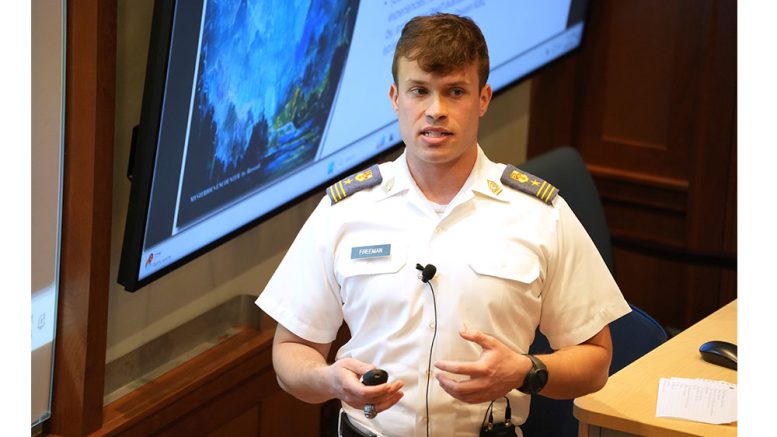Submitted
LEXINGTON, Va. – Brooks Freeman ’25, a Noblesville native and an English major at Virginia Military Institute (VMI), sought a common core between the philosophies of Jalāl al-Dīn Rūmī, a 13th century Middle Eastern Sufi mystic and poet, and Søren Kierkegaard, a 19th century Danish philosopher, theologian, and poet, in his honors presentation, “Varieties of Mystical Experience: Encountering the Absolute in Rūmī and Kierkegaard.”
Freeman found inspiration for his research after traveling to England and Morocco in the summer of 2023. In England, he studied existential philosophy and comparative religion.
“Going into the existential philosophy class, the first person we read was Kierkegaard, who is regarded as the original existentialist,” Freeman said. “He wrote extensively about faith, and I became interested in his ideas. In my comparative religion class, I learned a little about Sufism and Christian mysticism, and found those to be very interesting.”
Upon returning to VMI the following fall, he decided he wanted to compare the two thinkers for his honors thesis.
Freeman cited Pseudo-Dionysius, an ancient Greek theologian, for his definition of mysticism.
“‘The experiential encounter with the utterly transcendental reality that God is,’” Freeman said. “Basically, a meeting with God.”
He described some differences between Christian mysticism and Sufism.
“The first and most obvious difference would be their foundations; Sufism founded from Islam, and Christian mysticism from Christianity,” Freeman explained. “They also have different end goals. Christian mysticism is about union with God while keeping one’s individual characteristics, and Sufism is about annihilation of oneself to form a kind of oneness with God.”
Similarities he listed between the two philosophies include the individual taking an internal journey toward divine union, poetry rich in symbolism, and teaching and guidance.
“Then the final thing is this idea of the absurd that you can see in Kierkegaard’s writing,” he said. “It has to do with something that cannot be comprehended logically, but is believed through faith, which Kierkegaard wrote is extremely difficult. It is something that is present in Rūmī’s writing as well.”
Freeman defended the premise of comparing the two authors because they are still relevant, they are widely read outside of their faith tradition, there is a lack of research comparing them, and they both sought a similar mystical path.
Freeman concluded that the paths of Kierkegaard and Rūmī are similar, but warned that the commonalities are steeped in their respective traditions, so context must be appreciated. Studying them in conjunction displays that mystical experiences can at once be common and contextualist.
Freeman’s advisor, Lt. Col. Patrick Eichholz, associate professor in the Department of English, Rhetoric, and Humanistic Studies, has known Freeman for four years.
“I first met Brooks through the adopt-a-rat program, and it’s been a real pleasure to watch him develop as a scholar,” Eichholz said. “I knew there was something different about Brooks the first time he came over to my house. When the other rats asked for the Netflix password, Brooks asked for book recommendations. After Breakout, I saw a lot less of Brooks, but I was not surprised when I heard all the updates that Brooks was joining the honors program, preparing for the LSAT, and traveling overseas for various study abroad opportunities.”
Freeman is minoring in Arabic. He is an alumnus of Culver Academies and the son of Lee and Rose Freeman. He plans to attend law school following graduation.

